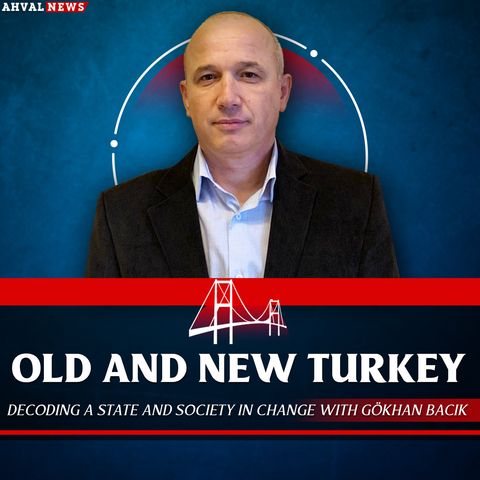
-
How will Erdoğan-Biden meeting reflect on Turkey's domestic politics?
18 JUN 2021 · Yavuz Baydar, Editor-in-Chief of Ahval, spoke with political science professor Gökhan Bacık.29m 12s -
'After the pro-Kurdish HDP, Erdoğan's new target is the main opposition, the CHP' - Gökhan Bacık
15 APR 2021 · 'After the pro-Kurdish HDP, Erdoğan's new target is the main opposition, the CHP' - Gökhan Bacık35m 28s -
Turkey’s ‘state-oriented’ political parties upholding nationalism – Professor Gökhan Bacık
29 MAR 2021 · Turkey’s ‘state-oriented’ political parties upholding nationalism – Professor Gökhan Bacık27m 2s -
What does the AKP Congress, Erdoğan's message signify for Turkey's future? - Prof Gökhan Bacık
26 MAR 2021 · Turkish President Recep Tayyip Erdoğan consolidated his power at the Justice and Development Party’s (AKP) recent congress in Ankara, Gökhan Bacık, a lecturer in political science at Palacky University, told an Ahval podcast. Speaking to Ahval Editor-in-Chief Yavuz Baydar, Bacık said the AKP gathering on Wednesday showed a one-party system had been established in Turkey.34m 8s -
Erdoğan's multiple moves escalate tension: What are his motives and ultimate aim? - Gökhan Bacık
21 MAR 2021 · Erdoğan's multiple moves escalate tension: What are his motives and ultimate aim? - Gökhan Bacık34m 56s -
'How Erdoğan changed the relations between Turkish state and Islamic groups' - Gökhan Bacık
15 MAR 2021 · Today that may be surprising given the deep religiosity that has come to characterise President Recep Tayyip Erdogan and his ruling Justice & Development Party (AKP). The extent to which Erdogan’s Islamist leanings has filtered into public life has caused many Turks to chafe, but the president has persisted in his imposition of a more religious character onto Turkey. Dr. Gökhan Bacık explained in a recent podcast interview with Ahval News’ Editor-in-Chief Yavuz Baydar that traditionally the state has long used religion to help govern Turkey. However, the relationship was traditionally more asymmetric than it may be today. “What we call Turkish state tradition has been more or less the same since the thirteenth century,” said Bacik, who teaches political science at Palacky University in the Czech Republic and is an expert on Turkish and Middle Eastern politics. Rulers in Turkey during the Seljuk, Ottoman and republican era have all used Islamic groups in different ways as part of their governance. As the host of the caliphate and while controlling Mecca, Medina and Jerusalem, Islam’s three holiest cities, Ottoman rulers relied especially on Islam to cement its legitimacy as the centre of the Muslim world. Once the Ottoman Empire collapsed, the new Turkish republic under Mustafa Kemal Ataturk underwent a process of reducing the power of Islam vis-a-vis the state, but not removing it completely. To this end, the Ministry of Religious Affairs was established in 1924 “to administrate the affairs related to faith and worship of the religion of Islam”. Bacik acknowledges that Islam in Turkish politics was frequently used as an “ideology of justification” and was not always a “dynamic paradigm.” To this end, Turkey’s government would be content to work with religious groups, but only so long as it was the dominant player. “When a group becomes too powerful to challenge the power elite, the state is quick to purge it,” said Bacik. This has been a defining feature in the story of President Erdogan’s rise to power and take-over of the state. For years, Erdogan was a member of numerous Islamist parties that were suppressed by the republican authorities, but once he became prime minister in 2003, Erdogan found a ready ally in the movement of Fethullah Gulen. Together, they took over numerous posts in the government and worked together to defang the military, who saw itself as the protector of state secularism. This partnership began crumbling after the Gezi Park protests and corruption investigations against the AKP in 2013. The drift reached a climax in 2016 after the failed coup attempt against Erdogan that he blamed on Gulen and his followers. Today they are regarded by terrorists by the Turkish state. In some sense, Erdogan is a part of both trends; using religion as an ideology of justification and increasing pressure on it when religious forces opposed to him becomes a force in its own right. “Erdogan has always been a part of this network, but skeptical of these religious orders,” Bacik explained.36m 49s -
27m 57s
Copyright 2024 - Spreaker Inc. an iHeartMedia Company
